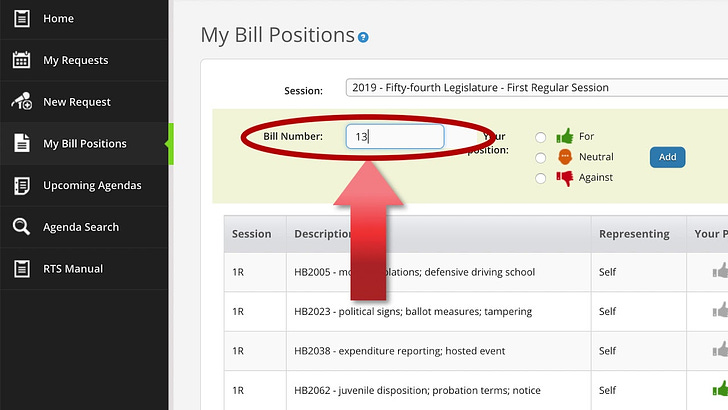If you’re a regular reader of the CEBV Weekly, you’re doubtless tired of seeing so much tinfoil-hat nonsense on legislative committee agendas every week. “Where are all the good bills?” you may be asking.
Well, we’ve got you, fam. In this special edition of the Weekly, we present 25 bills (for building the Arizona we want in 2025) that showcase positive policies on a range of issues affecting Arizonans. From reproductive rights to affordable housing, from education to public safety, there’s sure to be a bill here you’ll be passionate about.
Advocating for these bills is as easy as clicking a button. My Bill Positions, fondly nicknamed “RTS 2.0,” is a way to show support for bills that have not yet made it onto a committee agenda. It’s easy to use and takes just a few seconds for each bill. You can’t leave comments, just give a simple thumbs up or down, but it’s well worth your time. Watch this 14-second video to see how it works:
Please take a few moments and give each of the bills below a simple thumbs up to indicate your support. Showing our lawmakers, media and others the future Arizonans want is the first step toward building that future for all of us.
Education
HB2363, sponsored by Mariana Sandoval (D-23), would create a study committee on educator health insurance costs. Gov. Hobbs’ educator retention task force found health insurance issues were a key problem for teachers; some report needing to cut spending on things like food and clothing to pay their health care premiums and other out-of-pocket costs. Study committees are the typical first step toward policy change. Assigned to House Education Committee (chair: Beverly Pingerelli).
HB2420, sponsored by Laura Terech (D-4), would ban corporal punishment in schools. Paddling, spanking and other physical punishments have no place in K-12 schools. Years of research link corporal punishment to poorer psychological, behavioral, and academic outcomes. The American Academy of Pediatrics says inflicting physical pain on children is not an effective or ethical method of behavior management and causes harm to students. Schools should be places where students and educators interact in positive, nurturing ways that foster growth, dignity and belonging, not places that condone violence and instill fear and mistrust. Assigned to House Education Committee (chair: Ken Bennett).
SB1399, sponsored by Mitzi Epstein (D-12), would make many accountability and transparency changes to Arizona's ESA voucher program. These include requiring fingerprinting for adults at voucher-funded schools who have unsupervised access to children, limiting luxury purchases, notifying parents of their legal rights, requiring voucher schools to report performance and financial metrics, and requiring ADE to budget appropriately for the program. Assigned to Senate Education Committee (chair: Ken Bennett).
SB1356, sponsored by Christine Marsh (D-4), would require those who take funding from ESA vouchers and have unsupervised access to children to undergo background checks, similar to what happens in public district and charter schools. Assigned to Senate Government Committee (chair: Jake Hoffman).
Environment & Water
SB1331, sponsored by Priya Sundareshan (D-18), and HB2397, sponsored by Quantá Crews (D-26), would repeal a law that prohibits state agencies from measuring any information which could be used for regulating greenhouse gas emissions. Increases in extreme heat, flooding, drought and wildfires are negatively impacting the health of Southwest residents, and over 80% of Arizonans favor strong action to curb global warming and air pollution. Collecting data on the problem is the natural first step. Assigned to Senate Natural Resources, Energy and Water (chair: Sine Kerr) and House Natural Resources, Energy and Water (chair: Gail Griffin).
HB2399, sponsored by Quantá Crews (D-26), would require people who pump groundwater from a well in Arizona that can pump more than 35 gallons per minute to measure how much water they’re pumping and to file an annual report with the state. In October, Gov. Hobbs ended a lease with a Saudi company that was pumping massive, unchecked amounts of groundwater to grow water-intensive alfalfa to feed to their dairy cattle in the Middle East. Thanks in large part to legislative gatekeepers like Gail Griffin who thwart regulation of Arizona groundwater, rural wells are drying up, putting Arizona’s future at risk. Assigned to House Natural Resources, Energy and Water (chair: Gail Griffin).
HB2359, sponsored by Stephanie Stahl Hamilton (D-21), and SB1326, sponsored by Priya Sundareshan (D-18), would ensure all houses built in an active management water area have an assured water supply. It closes the "wildcat subdivision loophole” that let Rio Verde Foothills houses get built without securing water. Co-sponsored by all Senate Democrats. Assigned to House Natural Resources, Energy and Water (chair: Gail Griffin) and Senate Natural Resources, Energy and Water Committee (chair: Sine Kerr).
Gun Safety
HB2233, sponsored by Jennifer Longdon (D-5), would require gun owners to keep their guns and ammo in a locked storage container, or to fit their firearm with a device that would render it inoperable without a combination or key. The bill, dubbed Christian’s Law, is named for a 15-year-old boy who went to spend the night with a friend and never returned after being killed in an accidental shooting. The boy’s father views the bill as similar to seatbelt or drunk driving laws, which have both been credited with saving countless lives: “What you have in your possession can take a life in an instant, and there’s a responsibility that goes with that.” The GOP-led legislature has consistently refused to consider any restrictions on firearms. Assigned to House Judiciary Committee (chair: Quang Nguyen).
Housing
SB1645, sponsored by Anna Hernandez, would prevent landlords from increasing a tenant's rent by more than 10% over the course of a year. This would stop corporate groups that are buying up housing in Arizona to rent out from raising the rent just because they can. Arizona’s housing crisis is multifaceted, and while increasing supply of affordable dwellings is crucial, so is keeping residents in their current homes through reasonable rent prices. Arizona continues to suffer a spike in evictions which shows no signs of slowing. Not assigned to a committee; contact Senate President Warren Petersen.
HB2220, sponsored by Laura Terech (D-4), would require cities and counties who want to limit the number of short-term rental properties within their boundaries to base that limit on the total population of the area or place a cap on the total number of short-term or vacation rentals in that area. In some communities, like Sedona, investors have bought up entire areas of housing to convert into short-term rentals, drying up housing availability for local residents. Not assigned to a committee; contact House Speaker Ben Toma.
HB2334, sponsored by Cesar Aguilar (D-26), would ban mobile home park owners from selling the park without first giving tenants 90 days notice and giving them the chance to purchase the park. The bill also exempts any capital gains income from the sale of the park to the tenants' or residents' association, nonprofit, or city or county housing authority from being taxed. Assigned to House Commerce Committee (chair: Justin Wilmeth).
HB2259, sponsored by Analise Ortiz (D-24), would repeal statewide preemptions on rent control, allowing cities and counties to regulate their own private residential housing units and mobile home spaces. Assigned to House Commerce Committee (chair: Justin Wilmeth), House Government Committee (Tim Dunn), and House Municipal Oversight & Elections Committee (chair: Jacqueline Parker).
HB2299, sponsored by Lorena Austin (D-9), would allow all Arizona cities and counties to allow “accessory dwelling units,” commonly known as guest houses, of up to 1200 square feet in single- and multi-family areas. Local government would still be able to regulate many finer points of the ADU, including parking, height, setbacks, landscape, and architectural review. Permit applications for lots with a home already on it would have to be processed within 60 days. Some cities, such as Phoenix, are already doing this. Assigned to House Commerce Committee (chair: Justin Wilmeth).
HB2488, sponsored by Selina Bliss (R-1), would allow a city to limit its number of short-term rentals based on the total percentage of residential homes in that city, and to regulate short-term rentals the same way it regulates hotels. This would stop people who buy property solely for the purpose of renting it out commercially from violating the property rights of their neighbors for their own financial gain. Not assigned to a committee; contact House Speaker Ben Toma.
HB2489, Bliss, sponsored by Selina Bliss (R-1), would allow cities to limit short-term rentals by setting a maximum number of them within city boundaries, requiring specific distances between them, and setting a maximum number of licenses for them. Not assigned to a committee; contact House Speaker Ben Toma.
LGBTQ+ Rights
HB2625, sponsored by Oscar De Los Santos (D-11), would prevent discrimination based on gender identity and sexual orientation in employment, education and housing. The bill would also prevent public and private entities receiving state funds from discriminating against LGBTQ+ people. Some Arizona cities have LGBTQ inclusive non-discrimination ordinances in place, including Phoenix, Tucson, Flagstaff, Glendale and Chandler. Our laws shouldn’t be used to hurt people, to impose one’s beliefs on others, or to discriminate — but attempts to implement statewide protections have failed to make it out of the legislature since at least 2016. Assigned to House Commerce Committee (chair: Justin Wilmeth) and House Judiciary Committee (Quang Nguyen).
Public Health and Safety
HB2312, sponsored by Patty Contreras (D-12), would give Arizonans more information on whether their doctor committed acts of sexual abuse, violence or improper prescribing of drugs, by extending posting of doctor misbehavior on the Arizona Medical Board’s web site to 25 years and requiring the board to post online the advisory letters it issues to doctors (which are already public record). Current law bans the website from showing more than the past five years of a doctor’s misbehavior, and the posting of “advisory letters” is prohibited altogether. Recent news reports have exposed that the board’s investigators are stretched thin and records of doctor misconduct are hidden from patients, putting Arizona patients at risk. Assigned to House Regulatory Affairs Committee (chair: Laurin Hendrix).
HB2337, sponsored by Stephanie Stahl Hamilton (D-21), would outlaw forcing pregnant prisoners to schedule induction of labor before their due dates, and would require strip searches to only be performed by correctional officers of the same gender as the prisoners being searched. In January 2023, the Arizona Republic reported that at least three women at Perryville Prison were induced early without their consent and without medical justification, reportedly because prison staff didn’t want to deal with an emergency situation in the middle of the night when it would be inconvenient for them. One advocate says she’s heard of officers making inappropriate comments during strip searches, and noted that strip searches can be humiliating, triggering trauma responses from inmates who have been victims of sexual assault. Assigned to House Military Affairs and Public Safety Committee (chair: Kevin Payne).
SB1220, sponsored by Christine Marsh (D-4), would drastically limit the number of days on which the use of consumer fireworks would be legal. Since lawmakers made fireworks legal, injuries have spiked, air quality has plummeted, and veterans and animals have suffered. Assigned to Senate Military Affairs, Public Safety, and Border Security Committee (chair: David Gowan).
SB1438 , sponsored by Rosanna Gabaldon (D-21), would cap the price of insulin at $35 for consumers. President Biden has already capped that cost for people on Medicare, but it remains high for millions of others. The American Diabetes Association says around 8.4 million diabetics in the US need to inject insulin to survive. The high out-of-pocket cost can lead to insulin rationing, a dangerous decision that may result in higher medical costs, emergency room visits, amputations, and death. Just three major manufacturers make up more than 90 percent of the insulin market. Nearly half of US states cap the cost of insulin for consumers. Assigned to Senate Finance & Commerce Committee (chair: JD Mesnard) and Senate Appropriations Committee (chair: John Kavanagh).
Reproductive Rights
HB2676, sponsored by Stephanie Stahl Hamilton (D-21), would repeal a 2018 law that requires hospitals and clinics to ask patients the reason they are seeking an abortion. The mandate serves no medical purpose, but instead seeks to dissuade people from exercising bodily autonomy. It’s none of the government’s business why people get abortions. Assigned to House Judiciary Committee (Quang Nguyen), House Health and Human Services (Steve Montenegro), and House Government Committee (Tim Dunn).
HB2677, sponsored by Stephanie Stahl Hamilton (D-21), would repeal Arizona’s 1864 (pre-statehood) abortion ban that subjects doctors to criminal penalties. The Arizona Supreme Court is currently considering a case arguing to reinstate that ban. Repealing the ban would protect women and medical professionals. Assigned to House Judiciary Committee (Quang Nguyen), House Health and Human Services (Steve Montenegro), and House Government Committee (Tim Dunn).
HB2678, sponsored by Stephanie Stahl Hamilton (D-21), would guarantee Arizonans’ right to obtain contraceptives. That right is at risk: Justice Clarence Thomas’ concurring opinion in the Dobbs decision (the ruling that overturned Roe v. Wade) specifically suggested the US Supreme Court “should reconsider” the 1965 ruling guaranteeing married couples’ use of contraception, saying it hinged on privacy rights he believes are not in the Constitution. GOP lawmakers insist they're not coming for contraception or marriage rights, yet the vast majority of them have voted against codifying them into law. Assigned to House Health and Human Services (Steve Montenegro).
Do you appreciate the many hours of work it takes to produce a resource like this? Throw a few bucks in our tip jar:
How do I contact these lawmakers?
If you want to contact a committee chair directly to discuss one of these bills, or thank a sponsor of one of the above bills for working on behalf of Arizonans’ best interests, refer to this handy list of contact info, committee chairs and assignments:











